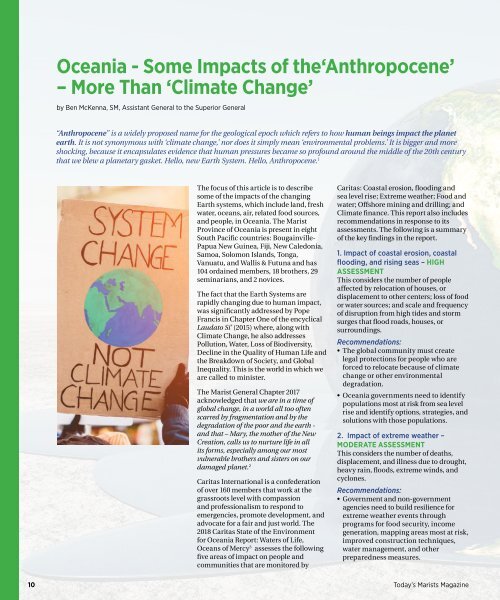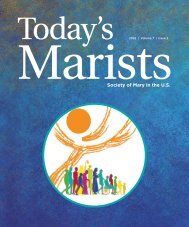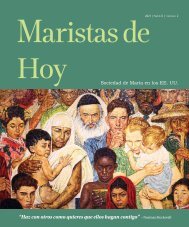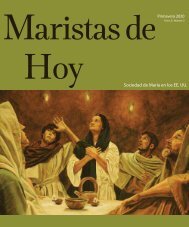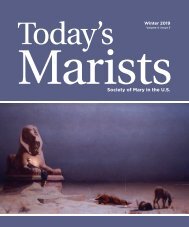Today's Marists Volume 5, Issue 1 Spring 2019
Create successful ePaper yourself
Turn your PDF publications into a flip-book with our unique Google optimized e-Paper software.
Oceania - Some Impacts of the‘Anthropocene’<br />
– More Than ‘Climate Change’<br />
by Ben McKenna, SM, Assistant General to the Superior General<br />
“Anthropocene” is a widely proposed name for the geological epoch which refers to how human beings impact the planet<br />
earth. It is not synonymous with ‘climate change,’ nor does it simply mean ‘environmental problems.’ It is bigger and more<br />
shocking, because it encapsulates evidence that human pressures became so profound around the middle of the 20th century<br />
that we blew a planetary gasket. Hello, new Earth System. Hello, Anthropocene. 1<br />
The focus of this article is to describe<br />
some of the impacts of the changing<br />
Earth systems, which include land, fresh<br />
water, oceans, air, related food sources,<br />
and people, in Oceania. The Marist<br />
Province of Oceania is present in eight<br />
South Pacific countries: Bougainville-<br />
Papua New Guinea, Fiji, New Caledonia,<br />
Samoa, Solomon Islands, Tonga,<br />
Vanuatu, and Wallis & Futuna and has<br />
104 ordained members, 18 brothers, 29<br />
seminarians, and 2 novices.<br />
The fact that the Earth Systems are<br />
rapidly changing due to human impact,<br />
was significantly addressed by Pope<br />
Francis in Chapter One of the encyclical<br />
Laudato Si’ (2015) where, along with<br />
Climate Change, he also addresses<br />
Pollution, Water, Loss of Biodiversity,<br />
Decline in the Quality of Human Life and<br />
the Breakdown of Society, and Global<br />
Inequality. This is the world in which we<br />
are called to minister.<br />
The Marist General Chapter 2017<br />
acknowledged that we are in a time of<br />
global change, in a world all too often<br />
scarred by fragmentation and by the<br />
degradation of the poor and the earth -<br />
and that – Mary, the mother of the New<br />
Creation, calls us to nurture life in all<br />
its forms, especially among our most<br />
vulnerable brothers and sisters on our<br />
damaged planet. 2<br />
Caritas International is a confederation<br />
of over 160 members that work at the<br />
grassroots level with compassion<br />
and professionalism to respond to<br />
emergencies, promote development, and<br />
advocate for a fair and just world. The<br />
2018 Caritas State of the Environment<br />
for Oceania Report: Waters of Life,<br />
Oceans of Mercy 3 assesses the following<br />
five areas of impact on people and<br />
communities that are monitored by<br />
Caritas: Coastal erosion, flooding and<br />
sea level rise; Extreme weather; Food and<br />
water; Offshore mining and drilling; and<br />
Climate finance. This report also includes<br />
recommendations in response to its<br />
assessments. The following is a summary<br />
of the key findings in the report.<br />
1. Impact of coastal erosion, coastal<br />
flooding, and rising seas – HIGH<br />
ASSESSMENT<br />
This considers the number of people<br />
affected by relocation of houses, or<br />
displacement to other centers; loss of food<br />
or water sources; and scale and frequency<br />
of disruption from high tides and storm<br />
surges that flood roads, houses, or<br />
surroundings.<br />
Recommendations:<br />
• The global community must create<br />
legal protections for people who are<br />
forced to relocate because of climate<br />
change or other environmental<br />
degradation.<br />
• Oceania governments need to identify<br />
populations most at risk from sea level<br />
rise and identify options, strategies, and<br />
solutions with those populations.<br />
2. Impact of extreme weather –<br />
MODERATE ASSESSMENT<br />
This considers the number of deaths,<br />
displacement, and illness due to drought,<br />
heavy rain, floods, extreme winds, and<br />
cyclones.<br />
Recommendations:<br />
• Government and non-government<br />
agencies need to build resilience for<br />
extreme weather events through<br />
programs for food security, income<br />
generation, mapping areas most at risk,<br />
improved construction techniques,<br />
water management, and other<br />
preparedness measures.<br />
10 Today’s <strong>Marists</strong> Magazine


